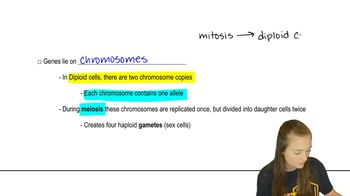You have identified a gene encoding the protein involved in the rate-limiting step in vitamin E biosynthesis. How would you create a transgenic plant producing large quantities of vitamin E in its seeds?
Table of contents
- 1. Introduction to Genetics51m
- 2. Mendel's Laws of Inheritance3h 37m
- 3. Extensions to Mendelian Inheritance2h 41m
- 4. Genetic Mapping and Linkage2h 28m
- 5. Genetics of Bacteria and Viruses1h 21m
- 6. Chromosomal Variation1h 48m
- 7. DNA and Chromosome Structure56m
- 8. DNA Replication1h 10m
- 9. Mitosis and Meiosis1h 34m
- 10. Transcription1h 0m
- 11. Translation58m
- 12. Gene Regulation in Prokaryotes1h 19m
- 13. Gene Regulation in Eukaryotes44m
- 14. Genetic Control of Development44m
- 15. Genomes and Genomics1h 50m
- 16. Transposable Elements47m
- 17. Mutation, Repair, and Recombination1h 6m
- 18. Molecular Genetic Tools19m
- 19. Cancer Genetics29m
- 20. Quantitative Genetics1h 26m
- 21. Population Genetics50m
- 22. Evolutionary Genetics29m
15. Genomes and Genomics
Genomics and Human Medicine
Problem B.13
Textbook Question
Imagine yourself in the same position as Kristen Powers, faced with the decision of whether or not to undergo a genetic test that will discover if you have inherited Huntington disease. List five life decisions or choices that you think are likely to be affected by the results of the genetic test. Do you think you would make the same choice to test that Kristen made? Why or why not?
 Verified step by step guidance
Verified step by step guidance1
Understand the nature of Huntington disease: it is a genetic disorder caused by a dominant allele, meaning that inheriting one copy of the mutated gene will likely result in developing the disease later in life.
Consider how a positive or negative test result could influence major life decisions, such as family planning (deciding whether to have biological children), career choices (choosing jobs with health benefits or less physical/mental stress), financial planning (saving for future medical care), lifestyle changes (adopting healthier habits), and psychological preparation (coping with the knowledge of potential disease onset).
Reflect on the emotional and ethical implications of knowing your genetic status, including the impact on relationships, privacy concerns, and potential discrimination, which might affect your decision to undergo testing.
Evaluate the pros and cons of taking the genetic test, such as the benefit of early awareness and planning versus the anxiety or stress that might come from knowing a positive result.
Formulate a personal stance on whether you would choose to be tested, based on your values, support system, and how you weigh the benefits and risks of knowing your genetic information.
 Verified video answer for a similar problem:
Verified video answer for a similar problem:This video solution was recommended by our tutors as helpful for the problem above
Video duration:
1mPlay a video:
Was this helpful?
Key Concepts
Here are the essential concepts you must grasp in order to answer the question correctly.
Genetic Testing and Inheritance
Genetic testing identifies whether an individual carries specific inherited mutations, such as the one causing Huntington disease, which is autosomal dominant. Understanding inheritance patterns helps predict the likelihood of developing the disease and informs personal and family health decisions.
Recommended video:
Guided course

Diploid Genetics
Psychological and Ethical Implications of Genetic Information
Receiving genetic test results can have profound emotional effects, including anxiety or relief, and raises ethical questions about privacy, discrimination, and the right to know or not know one’s genetic status. These factors influence decisions about testing and disclosure.
Recommended video:
Guided course

Modern Genetics
Impact of Genetic Information on Life Planning
Knowledge of a genetic condition like Huntington disease can affect major life choices such as career planning, family planning, financial management, and healthcare decisions. Anticipating disease onset may lead to proactive steps to manage or prepare for future challenges.
Recommended video:
Guided course

Bacteriophage Life Cycle

 6:51m
6:51mWatch next
Master Human Genome Composition with a bite sized video explanation from Kylia
Start learningRelated Videos
Related Practice
Textbook Question
482
views
